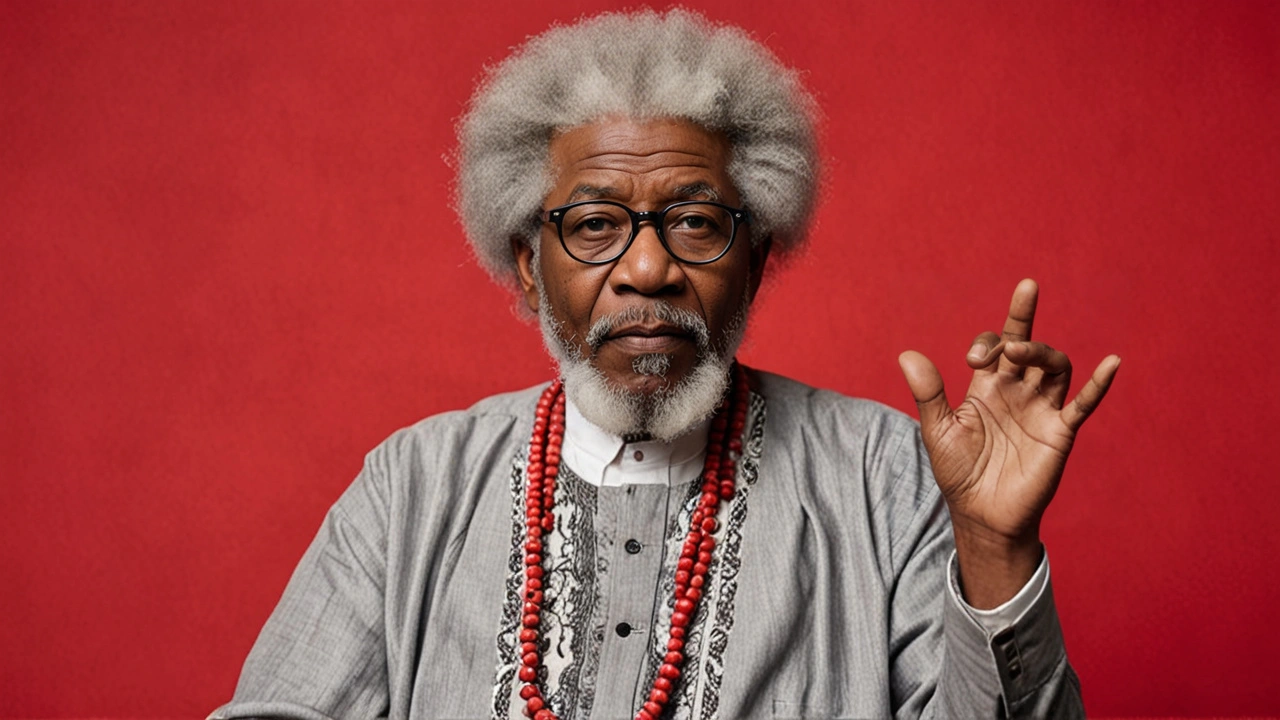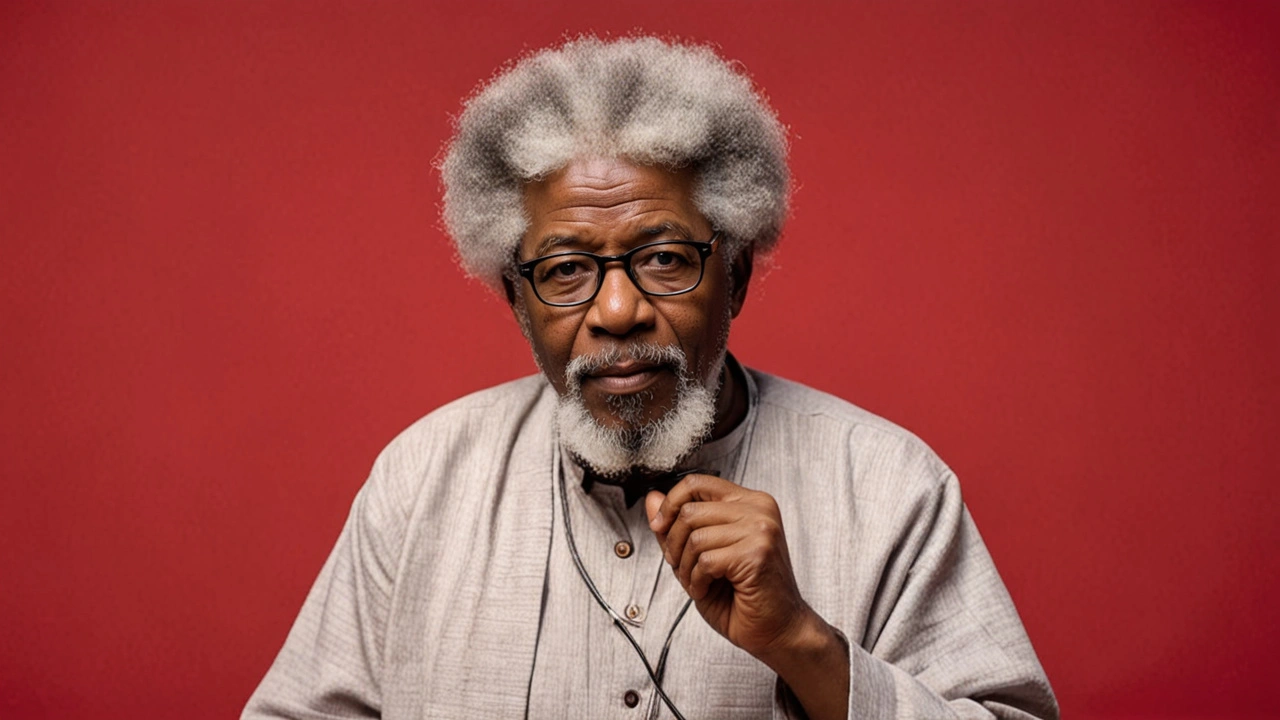Celebrating Wole Soyinka: A Literary Icon and Advocate for Human Rights
Wole Soyinka, born on July 13, 1934, in Abeokuta, Nigeria, is an influential figure who has left an indelible mark on both literature and human rights advocacy. His name reverberates through the corridors of African intellectualism and global literary circles, marking him as not just a writer, but a beacon of hope in the fight against oppression and injustice.
A Prodigious Talent in Literature
Soyinka’s literary works have set a benchmark for Nigerian literature and have made a significant impact worldwide. A playwright, poet, and essayist, his writings go beyond mere storytelling. They are poignant, deeply engaging, and often confront the disturbing realities of power and corruption. His acclaimed works, such as 'Death and the King’s Horseman' and 'The Lion and the Jewel', illustrate his mastery in combining traditional African themes with modern dramatic techniques.
While his plays have captivated audiences, his poetry and prose also encapsulate his profound reflections on society. His use of satire to depict the evils of power is both innovative and thought-provoking. Reading his works, one can’t help but be moved by the intensity and relevance of his themes, crafted with an elegance that is only achieved by a skillful literary giant.
Relentless Advocate for Human Rights
Soyinka’s commitment to human rights extends beyond the pages of his books. He has been a vocal critic of corrupt regimes and an unwavering advocate for social justice in Nigeria and beyond. During Nigeria’s civil war, his outspoken stance on the humanitarian issues led to his arrest and solitary confinement for 22 months. These experiences did not silence him; rather, they fueled his determination to speak out against oppression.
His autobiographical account, 'The Man Died: Prison Notes', chronicles his time in prison, highlighting his struggles and inherent resilience. This seminal work is not just a personal narrative but a powerful testament to the human spirit’s capacity to endure and overcome adversity. Soyinka’s words resonate with anyone who values justice and the relentless pursuit of freedom.
Influence and Legacy
Wole Soyinka's influence on Nigerian literature and culture cannot be overstated. He has inspired generations of writers, including notable figures like Femi Osofisan and Ahmed Yerima. His work transcends literary boundaries, becoming a political statement and an educational tool for those seeking to understand the complexities of Nigerian society and the broader African experience.
In 1986, Soyinka received the Nobel Prize in Literature, making history as the first African laureate. This recognition was not just an accolade for his literary achievements but a significant moment for African literature on the global stage. It celebrated the rich cultural heritage of Africa and brought attention to the continent’s ongoing struggles and triumphs.
The Continuing Relevance of Soyinka’s Work
As we celebrate Soyinka’s contributions, it is important to highlight the continued relevance of his work. Issues of power abuse, social injustice, and human rights violations are still prevalent in many parts of the world today. His writings serve as a reminder and an inspiration to challenge these issues, promote dialogue, and strive for a better society.
His plays, essays, and poems continue to be studied and performed, resonating with new audiences and sparking discussions on the role of art in society. Soyinka's impact on literature and human rights advocacy provides a powerful example of how words can effect change and inspire future generations.

A Lasting Tribute
Wole Soyinka remains a towering figure in literature and human rights advocacy. His life’s work, characterized by its depth, passion, and unwavering commitment to justice, leaves a lasting legacy that will continue to inspire and provoke thought for years to come. As we reflect on his prolific career and the obstacles he has overcome, we are reminded of the profound impact one individual can have on the world. Soyinka’s story is one of courage, resilience, and the enduring power of the written word.
In honoring Wole Soyinka, we celebrate not just a literary icon but a true advocate for human rights, whose voice continues to challenge and inspire us all.


Abby Culbertson
July 13, 2024 AT 19:17so sad wole soyinka still copped all dis respect.
Awolumate Muhammed Abayomi
July 21, 2024 AT 07:50Wole Soyinka's work really hits deep, man. I think his plays are like a mirror for our messed up societies, ya know? The way he blends tradition with modern drama is lit! Even though some folks overlook him, his voice still echoes loud.
Josh Tate
July 28, 2024 AT 20:24Totally feel ya, bro. The blend of old and new is what makes his stuff timeless. Plus, his activism gives the art a punch that you don't get from plain entertainment.
John Smith
August 5, 2024 AT 08:57Let’s cut the fluff: Soyinka didn’t just win a Nobel because he’s a good writer-he reshaped the entire landscape of postcolonial literature. His mastery of iambic pentameter in Yoruba‑infused verse is unmatched. Moreover, his political essays dissect the mechanics of neocolonial power structures with surgical precision. When you read “Death and the King’s Horseman,” you’re not just watching a play-you’re witnessing a decolonized narrative architecture. He also pioneered the use of satire as a weapon against authoritarian regimes, something most Western writers only toy with. In the 1980s, his detention became a case study in how intellectuals can be silenced, yet he turned that into a manifesto for resistance. Critics who say his work is “overly theatrical” simply don’t grasp the cultural symbolism he embeds in each scene. Bottom line: Soyinka is a paradigm, not a peripheral figure.
Alex Soete
August 12, 2024 AT 21:30Exactly, John. You nailed the part about satire being a weapon-Soyinka wields it like a scalpel. His influence on younger playwrights, especially across West Africa, is still palpable. I’ve seen university courses built entirely around his techniques. Keep the deep dives coming!
Cara McKinzie
August 20, 2024 AT 10:04Ugh, another “great man” post. Can we talk about how his *prison notes* read like a melodramatic soap?
Joseph Conlon
August 27, 2024 AT 22:37Look, I get the reverence, but let’s not pretend Soyinka’s legacy is a tidy hero’s journey. He was indeed a trailblazer, yet his privileged background gave him platforms that many grassroots activists never accessed. His literary brilliance is undeniable, but the same elite connections also insulated him from the harshest reprisals that ordinary dissenters faced. While his prison memoir showcases personal resilience, it also glosses over the collective suffering of countless unnamed prisoners. The irony is that his satirical edge often targets the very power structures that once nurtured his career. Moreover, his Nobel win propelled African literature onto a global stage, but it also fed into a market that commodifies “exotic” voices for Western consumption. He championed human rights, yes, but his advocacy sometimes sidestepped more radical grassroots movements, opting for diplomatic channels that many consider too polite. The plays, while rich in cultural texture, sometimes prioritize mythic symbolism over concrete calls to action. In academic circles, his work is dissected endlessly, yet in the streets, his influence is uneven. He inspired a generation of writers, but also set a lofty benchmark that threatens to alienate emerging talents who lack his formal education. When we celebrate his achievements, we should also critique the structural privileges that amplified his voice. His stories of oppression are powerful, but they can also be appropriated by those who want to appear socially conscious without real engagement. In short, Soyinka is both a beacon and a reminder of the complexities of literary fame within activist circles. So, while we honor his contributions, let’s keep a nuanced lens on how fame, power, and resistance intersect in his narrative.
Mohit Singh
September 4, 2024 AT 11:10Sure, Soyinka's great, but his style can feel pompous at times.
Damian Liszkiewicz
September 11, 2024 AT 23:44He did open doors for African voices 🌍. The global literary scene benefits from that inclusion.
Angela Arribas
September 19, 2024 AT 12:17Honestly, the over‑hype sometimes masks the finer critiques, but he still deserves credit :)
Sienna Ficken
September 27, 2024 AT 00:50Oh wow, another tribute-because we haven't heard enough about the Nobel‑winning playwright who also dabbles in political activism. Nice to know his “deep” themes are still relevant, as if we needed a reminder that power corrupts. I guess we’ll keep re‑reading his poetry while sipping overpriced coffee.
Zac Death
October 4, 2024 AT 13:24Hey, I hear you, Sienna. Soyinka’s work does tend to get recycled in academic circles, but that’s because it offers layers you can peel forever. His blend of myth, history, and sharp political commentary creates a tapestry that never truly ages. When you sit down with “The Lion and the Jewel,” you’re not just reading a story; you’re experiencing a cultural dialogue that still sparks debates today. Plus, his willingness to get his hands dirty-like enduring 22 months in a Nigerian jail-adds authenticity that textbooks can’t fake. So, even if the hype feels a bit overdone, the core of his message still resonates, especially for folks fighting oppression worldwide. Keep the conversation alive; it’s the only way his legacy stays vibrant.
Lizzie Fournier
October 12, 2024 AT 01:57All these viewpoints remind us that literature isn’t just about words, it’s about community. Soyinka’s legacy shows how art can bridge gaps across continents.
JAN SAE
October 19, 2024 AT 14:30Absolutely, Lizzie!; The way Soyinka weaves cultural nuance into his narratives is a masterclass in storytelling; It encourages emerging writers to be bold and thoughtful; Let’s keep sharing these insights with anyone eager to learn!;
Steve Dunkerley
October 27, 2024 AT 02:04From a post‑colonial theory perspective, Soyinka's intertextuality functions as a decolonial praxis, destabilizing hegemonic narratives through strategic hybridity.
Jasmine Hinds
November 3, 2024 AT 14:37Let’s keep the energy up vibes we can all learn from his fearless voice :)
Madison Neal
November 11, 2024 AT 03:10Indeed, his contributions have catalyzed discourse within literary and human‑rights circles, fostering interdisciplinary collaborations.
John Crulz
November 18, 2024 AT 15:44Curious how new playwrights today are adapting Soyinka’s techniques to modern digital platforms-definitely something to watch.